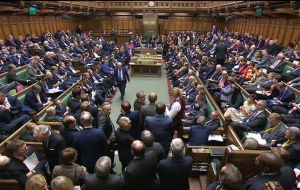MercoPress. South Atlantic News Agency
Weakened Theresa May suffers three defeats in Commons
 Mrs. May said Brexit divisions had become “corrosive” to UK politics and the public believed the issue had “gone on long enough” and must be resolved
Mrs. May said Brexit divisions had become “corrosive” to UK politics and the public believed the issue had “gone on long enough” and must be resolved  By 311 votes to 293, the Commons supported a motion demanding full disclosure of the legal advice given to cabinet before the Brexit deal was agreed
By 311 votes to 293, the Commons supported a motion demanding full disclosure of the legal advice given to cabinet before the Brexit deal was agreed Theresa May has suffered three Brexit defeats in the Commons as she set out to sell her EU deal to skeptical MPs. Ministers have agreed to publish the government's full legal advice on the deal after MPs found them in contempt of Parliament for issuing a summary. And MPs backed calls for the Commons to have a direct say in what happens if the PM's deal is rejected next Tuesday.
Mrs May said MPs had a duty to deliver on the 2016 Brexit vote and the deal on offer was an “honorable compromise”.
She was addressing the Commons at the start of a five-day debate on her proposed agreement on the terms of the UK's withdrawal and future relations with the EU.
The agreement has been endorsed by EU leaders but must also be backed by the UK Parliament if it is to come into force. MPs will decide whether to reject or accept it on Tuesday 11 December.
Mrs. May said Brexit divisions had become “corrosive” to UK politics and the public believed the issue had “gone on long enough” and must be resolved.
By 311 votes to 293, the Commons supported a motion demanding full disclosure of the legal advice given to cabinet before the Brexit deal was agreed.
The move was backed by six opposition parties, including Northern Ireland's Democratic Unionist Party which has a parliamentary pact with the Conservatives.
It came after Attorney General Geoffrey Cox published a summary of the advice on Monday and answered MPs questions for three hours, but argued that full publication would not be in the national interest.
Labour had accused ministers of “willfully refusing to comply” with a binding Commons vote last month demanding they provided the attorney general's full and final advice.
After Labour demanded the advice should be released ahead of next Tuesday's key vote on Mrs May's deal, Commons Speaker John Bercow said it was “unimaginable” this would not happen.
In response, Commons Leader Andrea Leadsom said she would “respond” on Wednesday, but would ask the Commons Privileges Committee to consider the constitutional repercussions.
An attempt by ministers to refer the whole issue, including the government's conduct, to the committee of MPs was earlier defeated by four votes.
The privileges committee will now decide which ministers should be held accountable and what sanction to apply, with options ranging from a reprimand to the more unlikely scenario of a minister being suspended from the Commons.
Lib Dem leader Sir Vince Cable said the result left the government “on the ropes”, adding: “Theresa May's majority has evaporated, and the credibility of her deal is evaporating with it.”
The prime minister suffered a further setback on Tuesday as MPs backed, by 321 votes to 299, changes to the parliamentary process should the Commons vote down her deal next week.
If that happens, the government has 21 days in which to return to the House and set out what it plans to do next.
But Tory Dominic Grieve's motion means that instead of MPs being confined to merely taking note of what the government tells them, the Commons would be able to exert more influence by voting on what they wanted the government to do as well.
Tuesday's vote, in which 26 Tory MPs rebelled, could potentially tilt the balance of power between government and Parliament if, as expected, MPs push for a “Plan B” alternative to Mrs. May's deal and also seek to prevent any chance of a no-deal exit.
Mr. Grieve, who has expressed support for another Brexit referendum, told Channel 4 News he was not seeking to “guarantee a particular outcome” if Mrs. May's deal went down.
But he said it would “allow the UK time to consider its options”, including potentially re-starting negotiations with the EU or giving the public the final say.
As she sought the backing of the Commons for her Brexit deal, the prime minister said she was confident the UK would enjoy a “better future” outside the European Union.
She said the “honorable compromise” on offer was “not the one-way street” many had portrayed it to be and that the EU had made it clear that the agreement would not be improved on.
“I never said this deal was perfect, it was never going to be. That is the nature of a negotiation,” she said.
“We should not let the search for a perfect Brexit prevent a good Brexit... I promise you today that this is the very best deal for the British people and I ask you to back it in the best interest of our constituents and our country.”




Top Comments
Disclaimer & comment rulesCommenting for this story is now closed.
If you have a Facebook account, become a fan and comment on our Facebook Page!